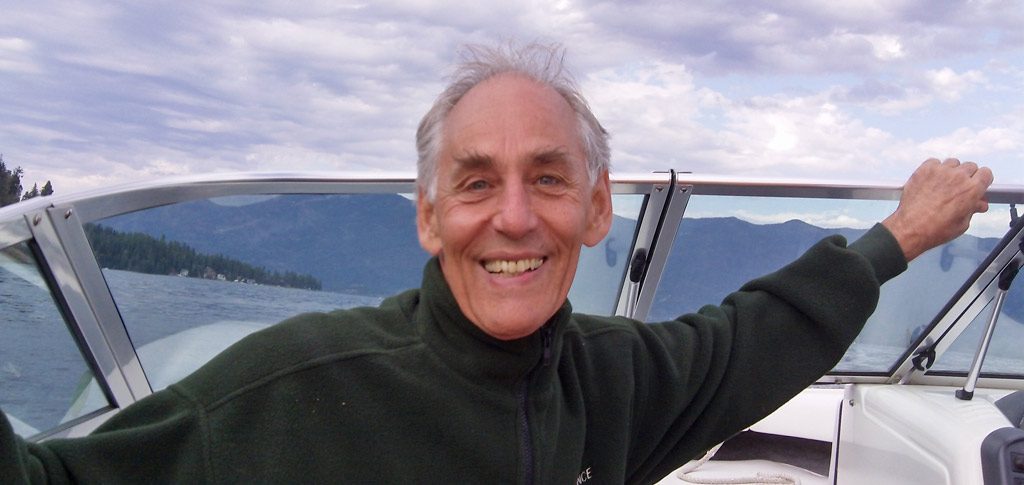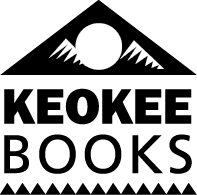Interview with Kenneth Cloke
From the Summer 2017 Issue
Photo by Dennis Thibault

Kenneth Cloke, global mediator
Co-founder of Mediators Beyond Borders offers local/global conflict resolution
In the summer, Kenneth Cloke relaxes with his wife Joan at his home in Hope and writes books – counting second and third editions, 10 of them to date. The rest of the year he works with two organizations he founded — the Center for Dispute Resolution in Santa Monica, California, and the globally based Mediators Beyond Borders — in the quixotic idea that he and others can use the tools of mediation to save the world.
Cloke earned his juris doctorate from Berkeley’s Boalt Law School, a Ph.D. and a master of laws from UCLA, has done post doctoral work at Yale University School of Law and is a graduate of the National Judicial College in Reno, Nevada. He has served as an administrative law judge, and is an adjunct professor of law at Pepperdine University’s School of Law, Strauss Institute; Southern Methodist University; Saybrook University and the University of Southern California.
He has applied that substantial resume to conflict resolution work in more than 20 countries, including Greece, Nicaragua, Ukraine, Zimbabwe, India, Pakistan, Cuba, Brazil, Ireland and the former USSR. He is a pioneer in the field of mediation and dispute, and his specialty is in resolving complex, multi-party conflicts.
His most recent book, “The Dance of Opposites: Explorations in Mediation, Dialogue and Conflict Resolution,” calls for a new vision in conflict resolution, looking for ways to open “heartfelt communication between opponents.”
You went from a traditional legal career into mediation. What attracted you to the field and why do you devote so much of your time to it?
There are so many problems with the law. For example, the law is quite formal, but the best problem-solving is done informally; it is highly logical, but every conflict has an emotional component that needs to be addressed; it is incredibly expensive and time consuming, but that puts it beyond the reach of many people who need help; its purpose is to decide which of two sets of facts are true, but it produces unfair results when both sets of facts are true. Justice and fairness happen far more often in mediation than they do in court, and nearly everyone appreciates being listened to and retaining control over outcomes, rather than denouncing each other and hoping a judge will see their position.
What is the Center for Dispute Resolution and what do you do within it?
I became a mediator in 1980, founded the Center for Dispute Resolution in 1983, and have mediated thousands of disputes of all kinds over the last 36 years. Instead of administrating I wanted to mediate, so as it grew the center has developed into a small group of people who share cases and ideas.
You also founded the global organization Mediators Beyond Borders in 2006 to “build local skills for peace.” Why, and what does that look like in practice?
Instead of always looking to war to solve global problems, we need to build the capacity of people in local communities to resolve their differences through dialogue, collaborative negotiation and mediation. We are a small group of volunteers who work in various countries without pay – for example, I went to Athens several times to train Greek mediators to conduct dialogues between immigrants and Greek citizens.
One of your last books was “Conflict Revolution: Mediating Evil, War, Injustice and Terrorism.” That seems… audacious in its scope.
Yes, it was audacious, which meant I had to approach it with an equal amount of humility. Every effort to resolve a conflict is audacious, because the people who are in it are stuck and have probably been stuck for a long time. Over time, I discovered the power and reach of this process. If I have learned some skills that might be useful and could possibly help resolve a conflict, who am I not to try?
You’re involved with Mediators Beyond Borders’ developing Rwanda project. What is that and what role do you play?
The Rwanda project is trying to build the capacity of people in communities to resolve conflicts, especially those between Hutus and Tutsis. I am now an advisor to the project.
Both your organizations use conflict resolution tools to address large-scale conflicts – are they more difficult to resolve than family conflicts?
Over several decades mediating both large and small disputes, I’ve learned that the ways we respond to conflict are very similar, for heads of nation states and for children on a playground. Some conflicts I’ve mediated have involved major disputes: between Armenians and Azerbaijanis, Ukrainians and Russians, Muslims and Hindus, Palestinians and Israelis. Others have taken place inside or between Fortune 500 companies, governments, political organizations, universities, school districts, labor and management, etc. I’ve learned at least as much by mediating personal disputes between spouses, family members, parents and children, and estranged siblings – even kids who commit crimes and their victims, or between children in schools.
What might your approach to a typical family dispute look like?
In one family, two brothers had not spoken for 15 years, and their two sisters convinced them to try mediation. I began by asking each of them the same question: What words would you use to describe the kind of family you most want to have? The younger brother said “honest,” the older brother said “respectful,” the younger sister said “caring,” and the older sister said “supportive.” I then asked, “Does anyone disagree with any of those words?” No one did, and I said, “Congratulations, you’ve just reached consensus,” and they laughed. I then asked, “Are each of you prepared right now, in this conversation, to begin living up to those words?” And they all said yes. Finally, I asked, “Do each of us have permission to stop the conversation if we begin moving away from those words?” Again they said yes, and I began with the youngest brother, asking him why he chose the word “honest;” did he feel he had been lied to? He said “yes,” by his older brother, and described a time when they were children when his brother had not only lied, but forced him to lie too. Gradually, in this way, we were able to reveal what had happened, an act for which his brother apologized, and the sisters agreed to organize their first family holiday in 15 years.
And you believe disputes between countries are similar to that?
I designed a dialogue that took place between ordinary Israelis and Palestinians, that began by asking them to identify what they were proud of about their culture, to tell a story about what they or their family had suffered as a result of the war, to describe what their side was doing that was destructive or counterproductive to the other side, and to say what kind of life they wished — not just for their children, but for their grandchildren’s grandchildren — and then, one thing they were willing to do to help make that possible.
Why is conflict such a normal part of our lives?
We experience conflicts because everyone is different, every person is different from one moment to the next, and our needs and interests often clash. At the same time, we are also similar to each other and some part of us is the same from birth to death. So these basic facts create the possibility of both conflict and resolution. Mostly, conflicts represent the presence of two truths: perhaps two inner truths we are torn between, or two social truths that represent different goals or possible futures. All growth and change creates conflict; yet it’s not conflict that produces most of our problems, but the way we respond to it and how we think, feel and act in its presence.
You have written: “There is a better outcome than winning and losing.” But it seems written in our DNA that we can either be a winner or a loser. How do you lead people to change that thinking?
It isn’t easy, because that is our assumption, and what makes it more difficult is the possibility of moving beyond winning and losing only appears when we sit down with our opponents and listen to what they are actually saying, not so much in words, but deeper, beneath the pain and anger, beneath the accusations and defenses. This is not compromise, which is a cheap option, but something entirely new. For example, there are two ways to combine things. First, you can add cold water and hot water and get lukewarm water. That is compromise. Second, you can add water and flour and heat and make bread. That is what we are trying to do, make bread.
You also suggest that individual transformation is not enough, we must also work on community and cultural transformation. Why?
If we only change our communities, cultures, societies and systems, and don’t change ourselves, we will return sooner or later to those deeper patterns. And if we only change ourselves, we will find it difficult to continue being friendly or kind or skillful when others treat us badly. As a result, we need to do both. Sometimes one or the other is more important, but deep change requires both.
Can you give three steps that might help someone reading, who is experiencing a conflict, to reach a resolution?
There are probably thousands of steps each of us can take to improve our ability to resolve disputes, but if I were to narrow it down to three, it would be these:
1. Stop arguing and start listening and asking questions to find out what the other person has experienced, how they feel, what they want and why that matters to them.
2. Look below the surface to discover what is really going on, what the other person really cares about.
3. Tell the truth, but do so empathetically and not judgmentally, as though it were you it was being told to.
Is it possible to successfully mediate disputes in an age of “alternative facts?”
Yes. Everyone in conflict uses “alternative facts” to describe themselves and others – or tells the story about what happened only from their point of view. Also, people are not always clear in the beginning about what they want and instead become accusatory or defensive. However, if we ask what we would want if it were us, that can help us find the questions that may reveal the truth they they are reluctant to share, or have been hiding from, or don’t want to think about. This is not easy, but if we listen carefully to their stories, what they want appears, even when it is disguised, for example, as an accusation, or as anger, loss or fear.
Our country is badly politically polarized. How might we find less contentious ways to address our problems?
This is what I will be writing about this summer. If we think of politics just as social problem solving, it’s clear that we will do better at solving problems if we welcome diverse ideas about how to solve them, and can bring them into dialogue with each other. We all know this when it comes to large, threatening problems like 9/11, but we become polarized and lose our ability to listen and learn from each other when it comes to smaller issues that still feel important to us. Political conflicts can be seen as having three parts:
First, there have to be two or more individuals or groups, each with different beliefs, ideas, opinions, needs and interests. Without this, there can’t be a conflict.
Second, there has to be an inequality in power between these individuals or groups, in terms of their ability to implement their diverse beliefs, ideas, and opinions. Without this, the conflict won’t be political.
Third, there has to be an adversarial, win/lose process for problem solving or decision making that pits these groups against each other, allowing only one to win. Without this, the conflict won’t be polarizing.
Conservatives and many on the right often seek to reduce political conflict by decreasing diversity, or boosting respect for accepted, conventional ideas and supporting established authority; liberals and many on the left seek to do so by increasing equality, drawing attention to new and diverse ideas, and supporting the freedom to argue for and implement them. Neither side, however, focuses much attention on the adversarial win/lose nature of the political process, without which diversity and inequality do not result in polarization.
So what we mostly need to do is talk to each other in ways that promote learning and search for solutions that don’t require winners and losers, exactly as people often do in mediation.
Can conflict resolution be self-taught?
Yes, it can, but we are our own worst teachers, and do not make very good students, so it takes a while. For example, in conflict resolution, an “interest” is not what someone wants, but the reasons why they want it. So spouses and couples can learn to ask each other questions like:
“Why is that important to you?,” “Why do you care so deeply about that?,” “What does that mean to you?,” or, “Is this conversation working?” And if it’s not, “What is one thing I could do that would make this conversation work better for you?” The list is endless.
You wrote: “At the moment, we are not even close to being able to respond sensibly or successfully to global disasters, let alone able to accept responsibility for solving the far more arduous problem of becoming ecologically sustainable in the long run. What is worse, the skills we need to leverage these changes are widely regarded as optional, too expensive, “touchy-feely,” and threatening to the social, economic and political status quo. How, then, do we overcome these obstacles?” So, what’s the answer?
Our problems are increasingly global in scope; small problems that used to impact small, local areas can now impact all of us globally. Think of bird flu, or Ebola, or the Zika virus, all of which can easily cross the invisible borders of nation states. To solve them, we need to work closely with the people, countries and cultures where they appear, and because neither military force nor lawsuits can stop them, we need to work together. We are still far from being able to do this skillfully.
Much of your writing is driven from your concern over serious global issues – like climate change – that we seem to be unable to effectively address. What drives your urgency, and do you think the list of threats has changed?
Just in terms of population, we are changing the planet, and we haven’t yet recognized that natural systems that have been in balance for centuries can be thrown off balance by small, seemingly insignificant local changes. The air we breathe comes from the ocean and from forests and jungles, in large part from the Amazon River basin, but the current trend is toward deforestation and warmer oceans, which gradually reduces the amount of oxygen available for us to breathe. To solve these, or any other problems, we need skills in informal problem solving, open and honest communication, collaborative negotiation, dialogue, consensus building, and mediation. And we can now do this using powerful methods and techniques that we did not have even a few decades ago. Nearly every mediation demonstrates, even if it does not succeed, that it is possible for us to listen and communicate, to empathize and collaborate, and to jointly address our common problems. What we need now is to make that happen both locally and globally.




Leave a comment